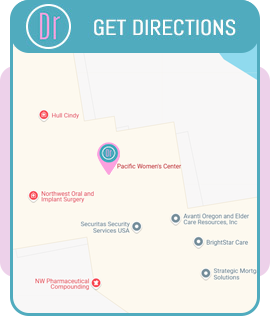What Could Cause a 21-Day Menstrual Cycle?
Dr. Richard Beyerlein, and Dr. Tamara A. Stenshoel, at Pacific Women’s Center help patients in Eugene, OR understand the causes of a 21-day menstrual cycle. Shorter cycles can be influenced by stress, hormonal imbalances, perimenopause, or underlying medical conditions. Our team offers compassionate, personalized evaluations to identify the root cause and recommend the best course of care. For more information, contact us or schedule an appointment online. We are conveniently located at 911 Country Club Rd. Suite 222, Eugene, OR 97401.


Table of Contents:
Is a 21-day menstrual cycle normal?
Can hormonal imbalances cause a 21-day menstrual cycle?
Can stress affect the length of my menstrual cycle?
How can I regulate my 21-day menstrual cycle?
At Pacific Women’s Center, we understand that each woman’s menstrual cycle is unique. Typically, a menstrual cycle ranges between 21 and 35 days, with an average of around 28 days. If your cycle has consistently been around 21 days without causing discomfort or disruption to your daily life, this may be perfectly normal for you.
However, if you’ve noticed recent changes—such as your menstrual cycle suddenly becoming shorter—or if you’re experiencing symptoms like heavy bleeding, severe cramps, fatigue, or spotting between periods, it could be a sign of an underlying medical condition. Common reasons for shorter or irregular menstrual cycles can include hormonal imbalances, thyroid issues, polycystic ovary syndrome (PCOS), uterine fibroids, or perimenopause (the transitional period leading up to menopause).
Our caring and knowledgeable medical professionals are here to help you understand your menstrual health. If you have any concerns or questions about your menstrual cycle, we encourage you to schedule a consultation. Our experienced OB/GYN providers will thoroughly evaluate your symptoms, perform appropriate diagnostic tests, and develop personalized services to help you achieve optimal health and comfort.
Hormonal imbalances can significantly impact the length and regularity of menstrual cycles, often resulting in cycles as short as 21 days. Typically, a normal menstrual cycle ranges from 21 to 35 days, with an average of about 28 days. When hormone levels—particularly estrogen and progesterone—become imbalanced, this can affect menstrual timing and consistency.
Several hormonal factors can contribute to shorter menstrual cycles. For instance, decreased progesterone levels may lead to an earlier shedding of the uterine lining, resulting in shorter intervals between periods. Elevated estrogen levels or changes in ovulation patterns due to hormonal disruptions can also shorten menstrual cycles. Conditions including polycystic ovary syndrome (PCOS), thyroid disorders, stress, significant weight fluctuations, or perimenopause often affect hormone regulation and may cause shorter or irregular cycles.
If you are consistently experiencing menstrual cycles of about 21 days or have concerns about hormonal imbalances, our compassionate team at Pacific Women’s Center is here to help. Our comprehensive approach includes reviewing your medical history, conducting a thorough physical exam, and ordering appropriate diagnostic tests such as hormone blood panels or imaging studies. Together, we’ll identify any underlying hormonal issues and develop a personalized treatment plan designed to restore menstrual regularity and optimize your reproductive health.
Stress often influences the length and regularity of your menstrual cycle by prompting your body to release stress hormones like cortisol. Elevated cortisol levels can disrupt the delicate hormonal balance—particularly estrogen and progesterone—that regulates your menstrual cycle, potentially altering the timing, duration, and intensity of your periods.
You may notice that during stressful times, your menstrual cycles become shorter or longer than usual. It’s also common to experience irregularities, such as skipped periods or spotting between cycles. Stress-induced hormonal fluctuations can further intensify menstrual symptoms, leading to increased cramping, mood swings, and overall discomfort.
Our team at Pacific Women’s Center encourages you to prioritize stress management through relaxation techniques, regular physical activity, adequate rest, and emotional support. These practices can help restore your hormonal balance and promote greater menstrual regularity and comfort.
If you find that stress-related menstrual irregularities persist or significantly affect your daily life, please don’t hesitate to reach out to us. Our compassionate healthcare providers are here to offer personalized evaluations and guidance tailored specifically to your needs.
We understand that each woman’s menstrual cycle is unique. If your menstrual cycle consistently lasts about 21 days, it’s shorter than the average 28-day cycle but still within the normal range (typically between 21 and 35 days). However, shorter cycles can sometimes be challenging and inconvenient to manage. Our dedicated healthcare providers are here to help you explore effective approaches to regulate your menstrual cycle and potentially achieve a more balanced routine.
Our team encourages a healthy, balanced diet rich in whole grains, fresh fruits and vegetables, lean proteins, and healthy fats. Nutritional support can encourage hormonal balance and promote overall reproductive wellness. Reducing your intake of processed foods, sugars, and caffeine may also positively impact your menstrual health.
Engaging in moderate physical activities like brisk walking, swimming, cycling, or yoga can help stabilize your hormonal levels. Intense or extreme exercise routines, however, may cause further disruption to your cycle. We can help you identify an exercise routine tailored specifically to your health needs and lifestyle.
We recognize that chronic stress can negatively impact hormonal balance and menstrual regularity. Our providers recommend stress-reduction techniques such as mindfulness meditation, yoga, deep breathing exercises, or simply carving out time for relaxation and enjoyable hobbies. Pacific Women’s Center can support you in finding personalized strategies to manage stress effectively.
Sleep quality directly influences hormone production and menstrual regularity. Our healthcare professionals advise maintaining consistent sleep patterns and aiming for seven to nine hours of restful sleep each night. If you struggle with sleep issues, we can discuss strategies to improve your sleep hygiene and overall health.
Significant weight fluctuations—either weight gain or loss—can disrupt hormone levels and affect menstrual cycles. Our healthcare providers can partner with you to determine a healthy weight range and offer personalized guidance and support to achieve your health and wellness goals.
We offer various hormonal birth control methods, including birth control pills, hormonal patches, and contraceptive rings, which can effectively regulate and stabilize menstrual cycles. Our team can help you determine if these options are appropriate for your specific situation and health history.
Sometimes shorter menstrual cycles may be related to underlying medical conditions such as thyroid imbalances, polycystic ovary syndrome (PCOS), or other hormonal disorders. If lifestyle changes alone aren’t effective, our experienced medical team can perform comprehensive evaluations and diagnostic testing and provide tailored treatments to address any underlying issues.
Your health and comfort matter to us. If you have concerns about your menstrual cycle length, discomfort, or other reproductive health issues, please reach out to Pacific Women’s Center. Our compassionate providers are here to listen, support, and guide you toward achieving optimal menstrual health and overall well-being. For more information, contact us or schedule an appointment online. We are conveniently located at 911 Country Club Rd. Suite 222, Eugene, OR 97401. We serve patients from Eugene OR, Springfield OR, Coburg OR, Creswell OR, Cottage Grove OR, Lowell OR, and Junction City OR, and surrounding areas.

ADDITIONAL SERVICES YOU MAY NEED
❱ Abdominal Hysterectomy
❱ Bladder Lift Surgeon Q&A
❱ Cervical Cone Biopsy
❱ Colposcopy
❱ Endometrial Ablation
❱ Endometrial Biopsy
❱ Female Sexual Dysfunction
❱ Gynecological Surgery
❱ Gynecology
❱ Hormone Therapy
❱ Vaginal Hysterectomy
❱ Endometriosis Diagnosis & Care



